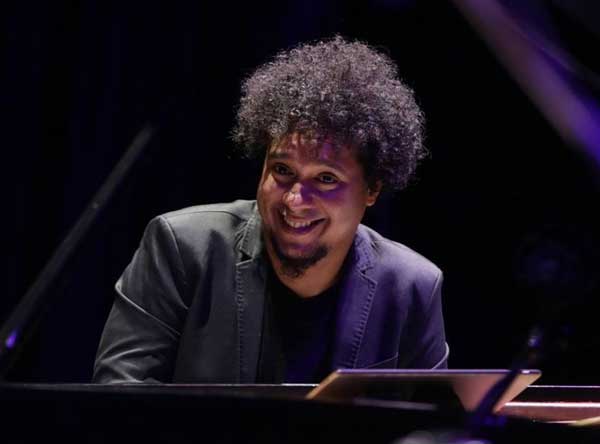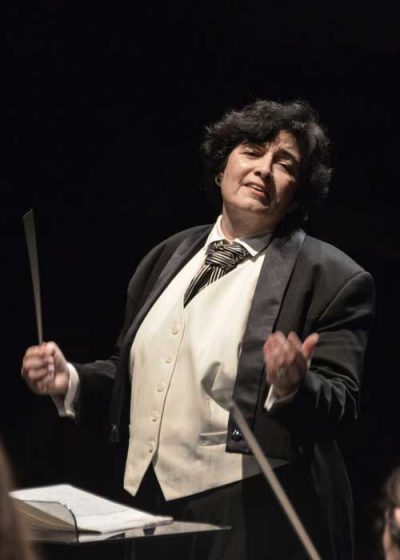Cuban pianist lights a fire with South Florida Symphony

Aldo López-Gavilán performed Ravel’s Piano Concerto in G with the South Florida Symphony Sunday night in Boca Raton.
The Cuban pianist Aldo López-Gavilán gave a warmly lyrical, effortlessly virtuosic performance of Ravel’s Piano Concerto in G Sunday night in Boca Raton, as the South Florida Symphony Orchestra embarked on a tour of venues along the state’s southeast coast.
Formerly known as the Key West Symphony Orchestra, the orchestra moved from its island birthplace several years ago and now performs at venues from Palm Beach through the Florida Keys. Performing Sunday at Spanish River Worship Center in Boca Raton, the ensemble displayed a big, smoothly efficient string section and well-balanced, agile and resonant woodwinds and brass.
There were glitches here and there, and intonation issues in high exposed passages in the violins. But conducted by Sebrina María Alfonso, the orchestra delivered a well-played, wide-ranging program of Berlioz, Ravel and the Israeli composer Nimrod Borenstein. The program will be repeated at major venues, including Miami’s Arsht Center and Fort Lauderdale’s Broward Center this week.
In the Ravel concerto, López-Gavilán easily handled the technical hurdles, playing with a light, assured virtuosity. But beyond that, he showed a genuine feel for the work’s bluesy melodies, making the most of these emotional high points with a natural warmth and sensitivity. There were a few glitches in the accompaniment, including the rapid opening melody, but in general the orchestra proved a lively and tonally refined partner.
In the long solo that opens the Adagio, López-Gavilán played in a free but flowing manner, bringing out the music’s meditative lyricism without ever letting it lose shape. Flute, oboe and other woodwinds played with great ardor and intensity as their melodies swelled over his running accompaniment in the piano. The brief concluding Presto came off as a quick burst of manic energy, with playing by López-Gavilán that was percussive and pointed, then smooth and fluid.
Alfonso led a boldly drawn performance of Berlioz’s Symphonie fantastique, giving a dramatic account of this portrait of an artist’s romantic obsession. The theme of the artist’s beloved, which appears throughout the work, came off in strings and woodwinds as a beguiling, free and restless melody, expressing the allure and elusiveness of the object of his obsession.
In the second movement, which portrays a ball, Alonso skillfully led the orchestra through a swirling, mysterious introduction from which the graceful waltz theme emerges. In the March to the Scaffold, in which the opium-addled artist imagines his own execution, Alfonso led a dire, well-controlled buildup, with understated force in the brass. When she finally unleashed the brass, they played with vigor but no rawness.
The last movement, which depicts the protagonist’s opium dream of a witches’ sabbath, was spookily effective. Playing in a light, creepy manner, the orchestra created a sound world of squeaking rats, rattling bones and all the other Halloween effects of Berlioz’s orchestration. The theme of his beloved, appearing here as a hideous participant in the witches’ festivities, came off in the woodwinds as effectively distorted and grotesque.
The surprise of the evening was Nimrod Borenstein’s If You Will It, It Is No Dream, a work inspired by a slogan from the writings of Theodor Herzl, the Zionist movement’s 19th century founder. The work received its U. S. premiere Sunday to mark the 70th anniversary of the 1948 founding of Israel.
One usually doesn’t have high hopes for such celebratory, ceremonial works. (Beethoven’s Wellington’s Victory may have put more schnitzel on the table than his Eroica and Ninth symphonies combined, but it remained a low point of his compositional career.) But in this case, rather than the usual ponderous pomp, Borenstein wrote a fleet, stormy, engrossing work.
The orchestra’s strings struck up frantic repeated figures that undergirded the work. A smooth, cinematic melody came high in the violins. The minor-key theme moved from instrument to instrument, finally appearing climactically in the brass. Alfonso drove the orchestra in a rapid, forward-leaning manner that gave this well-crafted work a heroic momentum.
The program will be repeated 7:30 pm Tuesday at the Broward Center in Fort Lauderdale; 7:30 p.m. Wednesday at the Arsht Center in Miami; and 7:30 p.m. Thursday at the Tennessee Williams Theatre in Key West. southfloridasymphony.org
Posted in Performances
Leave a Comment
Mon Apr 16, 2018
at 6:03 pm
No Comments







